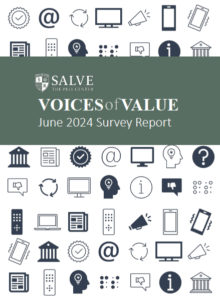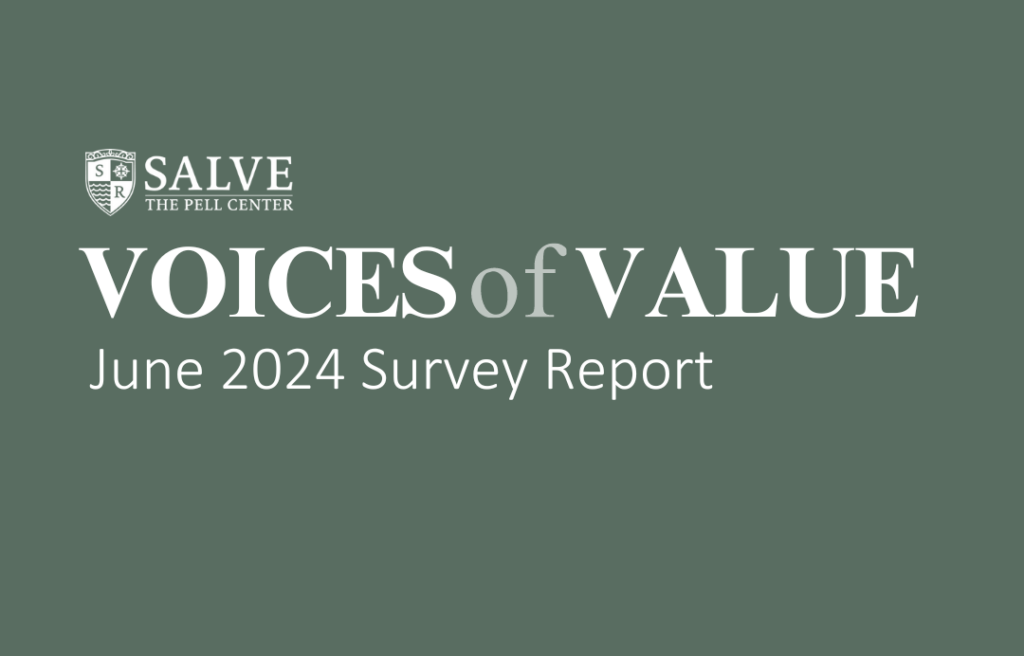Biden Leads Trump by 7-percentage points in New Rhode Island Survey from Pell Center at Salve Regina University
Congressional Democrats Enjoy More Comfortable Leads Against Republican Challengers
NEWPORT, R.I., June 25, 2024– Rhode Islanders view fake news as a primary contributor to increased political polarization and are concerned about the spread of inaccurate information during the 2024 election cycle, according to a new survey of likely Rhode Island voters from Salve Regina University’s Pell Center. The survey was directed by Pell Center Associate Director and Fellow Katie Sonder and fielded by Embold Research between June 5-14, 2024. It gathered responses from 1450 likely voters in Rhode Island, with a modeled margin of error of 2.8 percent. Respondents answered questions about the upcoming elections, contributors to political polarization, the health of U.S. democracy and their news consumption habits.
The data revealed likely voters in the Ocean State possess high levels of national pride, but over one-third think U.S. democracy is not healthy at all. Over three-quarters of voters believe political polarization has increased over the past year. More than two-thirds of members from each major political party are very concerned about the impact of misleading information during the 2024 elections.

Beyond misinformation concerns, Democrats worry about attempts to overturn the results of the election, violence or civil unrest, and voter suppression. Republicans are very concerned about voter fraud, the misuse of mail-in ballots, and inaccurate counting of ballots. Perhaps because of these fraud concerns, they are eight times less likely than Democrats to believe the 2024 U.S. elections will be fair and accurate.
President Biden has only a 7-percentage point lead over Trump among likely voters in the state. Unaffiliated voters will likely make the difference on election day. While they sway toward Trump (39% vs. 25% for Biden), over 30% of their vote is undecided or for Robert F Kennedy Jr. Congressional Democrats up for re-election have a much more comfortable lead against their Republican challengers.
The majority of voters surveyed view their Rhode Island identity as important, but 60% believe the state is heading in the wrong direction. Over half disapprove of Governor McKee’s job performance and nearly two-thirds disapprove of how he is handling the Washington Bridge crisis. Republicans are the most critical regarding this issue and are nearly twice as likely as Democrats to strongly disapprove.
There is general and bipartisan support for an independent Rhode Island Office of the Inspector General, with nearly half of likely voters in strong support. Only 19% of likely voters said they were unsure or needed more information about the proposal.
These concerns at both the state and national level may have led to a general fatigue. Nearly three-quarters of likely voters avoid the news, at least sometimes. Of those who do, about half avoid news about national politics and election coverage.

“These survey results paint a picture of a somewhat anxious electorate. Looking ahead to the next few months, most of us are concerned about obtaining accurate information and witnessing a peaceful transition of power through a free and trustworthy election process,” said Sonder. “While we can highlight a shared belief that fair elections are a cornerstone of democracy, the level of distrust in the electoral processes is in of itself concerning. It matches a level of distrust in democratic institutions, like Congress and the free press, which we see at the national polling level. No matter the outcome of November 5th, it’ll be worthwhile to invest in peace and reconciliation initiatives to rebuild trust and enhance productive civic engagement.”
This survey was conducted as a part of the Pell Center’s Voices of Value project that works to support a nuanced understanding of political polarization, encourage an empathetic approach to dissenting political opinions, reduce stereotyping and highlight commonalities.
As the first component of the project, the Pell Center conducted a survey in October 2023 to better understand Rhode Islanders’ views on important and timely political issues facing both the state and the nation. Respondents answered questions on topics like the health of U.S. democracy, the top contributors to polarization, and commons news consumption habits.
The full topline results and a statement of methodology are available here.
Katie Langford Sonder is the Associate Director of the Pell Center at Salve Regina University and directs the Center’s research agenda, contributing her own scholarship while supporting the work of Pell Center fellows. She also directs the Nuala Pell Leadership Program at the Pell Center which exposes a select number of diverse, high-achieving undergraduate students at Salve Regina to both the theory and practice of leadership with an emphasis on public service. Langford Sonder joined the Pell Center in 2022.

